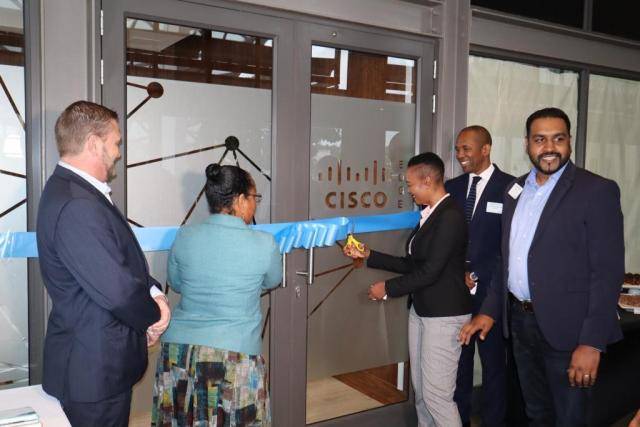Cisco South Africa Launches Avant-Garde Incubation Hub In Durban

Cisco South Africa has launched a state of the art incubation hub in Durban, KwaZulu-Natal near King Shaka International airport, a second-of-its-kind facility whose cost has been put up at R 10 Mn (USD 706,605).
The hub which will be based at the Dube Trade Port, and is a smart building with last word Cisco technology, offering wholesome business facilities including workspaces with high-speed broadband connectivity, video conferencing and collaboration platform, including boardroom and training facilities.
Resort For SMEs
Cisco Edge Incubation Center has been equipped with the necessary tools to help Small and Medium Enterprises garner connection to global Cisco experts that can help them develop business ideas and concepts in the digital world. A Researchgate report said that 93 percent of the SME owners in South Africa experience understanding of the market and potential for growth as a challenge.
In accordance to the SME Landscape Report 2018/2019 by a research firm known as In On Africa, the small business sector is an essential component of the national economy, as it stands a major source of job creation which in turn fuels economic growth. It’s pretty much common knowledge by now that SMEs are the lifeblood and backbone of any economy.
The report, however, upon serving more than 1,000 SME owners, as well revealed that small enterprises were at their earliest stages, prone to negative factors and in dire need of both financial and technical support. The major setback is access to funding and access to the market, as 52 percent of SME owners could not hide the fact that needed a great deal of assistance to reach markets as various industries were hyper-competitive.
Another research conducted by Bowler, Dawood, and Page (2006) and Phakisa (2009) estimate that 40 percent of new business ventures fail in their first year, 60 percent in their second year, and 90 percent in their first 10 years of existence.
“Our goal is to enable SMEs to accelerate their growth by ensuring they get access to world-class technology. We are living in a world that is changing faster than ever imagined, and we are inspired by the prospect of an economy with abundant jobs, a place where entrepreneurs can thrive,” said Clayton Naidoo, General Manager for Cisco Sub-Saharan Africa.
Adding, he said: “With technology comes many opportunities, especially in Africa, the fastest growing region in the world. Cisco recognizes Africa’s talent, and we want to continue being an enabler of tech ecosystems across the continent. With our resources, SMEs are not only able to grow but also stay competitive.”
Growth Acceleration
According to Naidoo, “With technology comes many opportunities, especially in Africa, the fastest growing region in the world. Cisco recognizes Africa’s talent, and we want to continue being an enabler of tech ecosystems across the continent. With our resources, SMEs are not only able to grow but also stay competitive”.
Dube Tradeport CEO, Hamish Erskine, says the objective of the Cisco Edge Center is to create a circle of opportunity for unemployed ICT graduates and that they plan to do this with an ecosystem of partners.
Representing the public Sector ecosystem will be SITA, who will work in collaboration with Cisco to incubate SMEs and ensure that they have the required skills to design, implement and manage government networks. These selected SMMEs will have an equal opportunity to bid for SITA/ government ICT projects.
“The kind of facilities at this hub will give entrepreneurs the kind of head start they require to gain a competitive advantage. It will also help them stay ahead of the game in a tough marketplace while boosting economic growth for the country,” says Erskine.
Per reports, the incubation center will provide SMEs with the avenue to employ graduates from its Networking Academy (NetAcad) program to give them work experience. Netacad is the world’s largest classroom giving students hands-on digital skills training for in-demand careers. For 20 years, the company has changed the lives of 9.2 million students in 180 countries. In South Africa alone, more than 62,000 students (29 percent of whom are female) have been trained with technical skills.